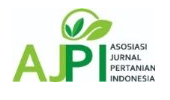PENGAMBILAN KEPUTUSAN PENGADAAN PRODUK SEGAR DAN KINERJA LAYANAN SUPLIER DI RITEL SUPERMARKET: SEBUAH PERSPEKTIF BUSINESS-TO-BUSINESS
Abstrak
Abstrak
Penelitian ini mengeksplorasi bagaimana pengambilan keputusan supermarket dalam pengadaan produk segar dengan mempertimbangkan persaingan produk segar lokal dan impor dan bagaimana kinerja layanan suplier produk segar dari perspektif business-to-business (B2B). Pengambilan data dilakukan melalui metode wawancara dengan pihak manajemen sebuah ritel supermarket XYZ yang beroperasi secara nasional, dan data dianalisis menggunakan analisis deskriptif kualitatif. Pengambilan keputusan terkait pengadaan produk segar dilakukan melalui strategi forward purchasing mechanism, sehingga pengadaan ditentukan oleh jenis produk yang dapat dipasok dan produk baru dipasarkan melalui sistem trial and error untuk melihat respon konsumen. Kinerja layanan suplier produk segar dinilai manajemen supermarket masih terkendala jaminan kepastian pasokan, kualitas produk, tingkat layanan, serta varian produk yang ditawarkan. Kebijakan supermarket yang menunjukkan keberpihakan kepada suplier lokal untuk memasok produk segar perlu didukung oleh peningkatan pengetahuan suplier mengenai product handling untuk meningkatkan tingkat layanan suplier kepada supermarket yang akan mempengaruhi keberlanjutan hubungan kerjasama bisnis. Penelitian ini berkontribusi kepada kajian tentang kualitas layanan B2B dan pengambilan keputusan B2B untuk keunggulan bersaing bisnis produk pangan di pasar ritel modern.
Kata kunci: kualitas layanan, pengambilan keputusan, hubungan business-to-business, ritel pangan, agribisnis
Abstract
This research takes the business-to-business perspective to explore supermarket decision-making in the procurement of fresh products by considering the competition between local and imported fresh products and the service performance of the fresh product supplier. The data was collected through interviews with the store management of a nationally operating XYZ supermarket, and the data was analysed using qualitative descriptive analysis. Decision-making related to the procurement of fresh products in the XYZ supermarket is based on the forward purchasing mechanism strategy and trial and error system to sell new fresh product varieties. Thus, product procurement decision-making is determined by the type of product that can be supplied and new product trials to get consumers' responses. The performance of fresh product supplier service is assessed, and supermarket management considers that fresh product suppliers still confront several obstacles related to the guarantees of product supply certainty, product quality, service level, and product variants offered. The supermarket policy's empowerment to choose local suppliers to supply fresh products also needs to be supported by increased supplier knowledge of product handling to improve the supplier's service level to the supermarket, which will affect the sustainability of business relationships. This research contributes to the research on B2B service quality and B2B decision-making for the competitive advantage of agri-food businesses in the modern retail market.
Keywords: service quality, decision-making, business-to-business relationship, food retail, agribusinessTeks Lengkap:
PDF Hal. 48-61Referensi
Besik, D., & Nagurney, A. (2017). Socio-Economic Planning Sciences Quality in competitive fresh produce supply chains with application to farmers ’ markets. Socio-Economic Planning Sciences, 60, 62–76. https://doi.org/10.1016/j.seps.2017.03.001
Bingham, A. J. (2023). From Data Management to Actionable Findings: A Five-Phase Process of Qualitative Data Analysis. International Journal of Qualitative Methods, 22, 1–11. https://doi.org/10.1177/16094069231183620
Grunert, K. G., Zhou, Y., Banovic, M., & Loebnitz, N. (2021). Supermarket competence in emergent markets: Conceptualization, measurement, effects, and policy implications. Journal of Consumer Affairs, June, 1–27. https://doi.org/10.1111/joca.12398
Hollmann, T., Jarvis, C. B., & Bitner, M. J. (2014). Reaching the breaking point: a dynamic process theory of business-to-business customer defection. Journal of the Academy of Marketing Science, 43(2), 257–278. https://doi.org/10.1007/s11747-014-0385-6
Lu, L., & Reardon, T. (2018). An Economic Model of The Evolution Of Food Retail and Supply Chains From Traditional Shops to Supermarkets to E-Commerce. American Journal Agricultural Economic, 100(5), 1320–1335. https://doi.org/10.1093/ajae/aay056
Reardon, T., Timmer, C. P., & Minten, B. (2010). Supermarket revolution in Asia and emerging development strategies to include small farmers. 1–6. https://doi.org/10.1073/pnas.1003160108
Utami, H. N. (2023). Potensi Ritel Pangan Berbasis Perdagangan Digital Dengan Memahami Perilaku Konsumen: Perspektif Pelaku Agribisnis. Mimbar Agribisnis, 9(2), 1503–1514. https://doi.org/http://dx.doi.org/10.25157/ma.v9i2.9795
Utami, H. N., & Alamanda, D. T. (2021). Key Factors Determining Relationship Marketing In The Food E-Commerce Network: A Business-To-Business Service Perspective. Agricore : Jurnal Agribisnis Dan Sosial Ekonomi Pertanian Unpad, 6(2), 130–137. https://doi.org/10.24198/agricore.v6i2.37354
Zhou, J., Helen, J. H., & Liang, J. (2011). Implementation of food safety and quality standards: A case study of vegetable processing industry in Zhejiang, China. Social Science Journal, 48(3), 543–552. https://doi.org/10.1016/j.soscij.2011.06.007
DOI: https://doi.org/10.24198/agricore.v9i1.55248
Refbacks
- Saat ini tidak ada refbacks.
##submission.copyrightStatement##













